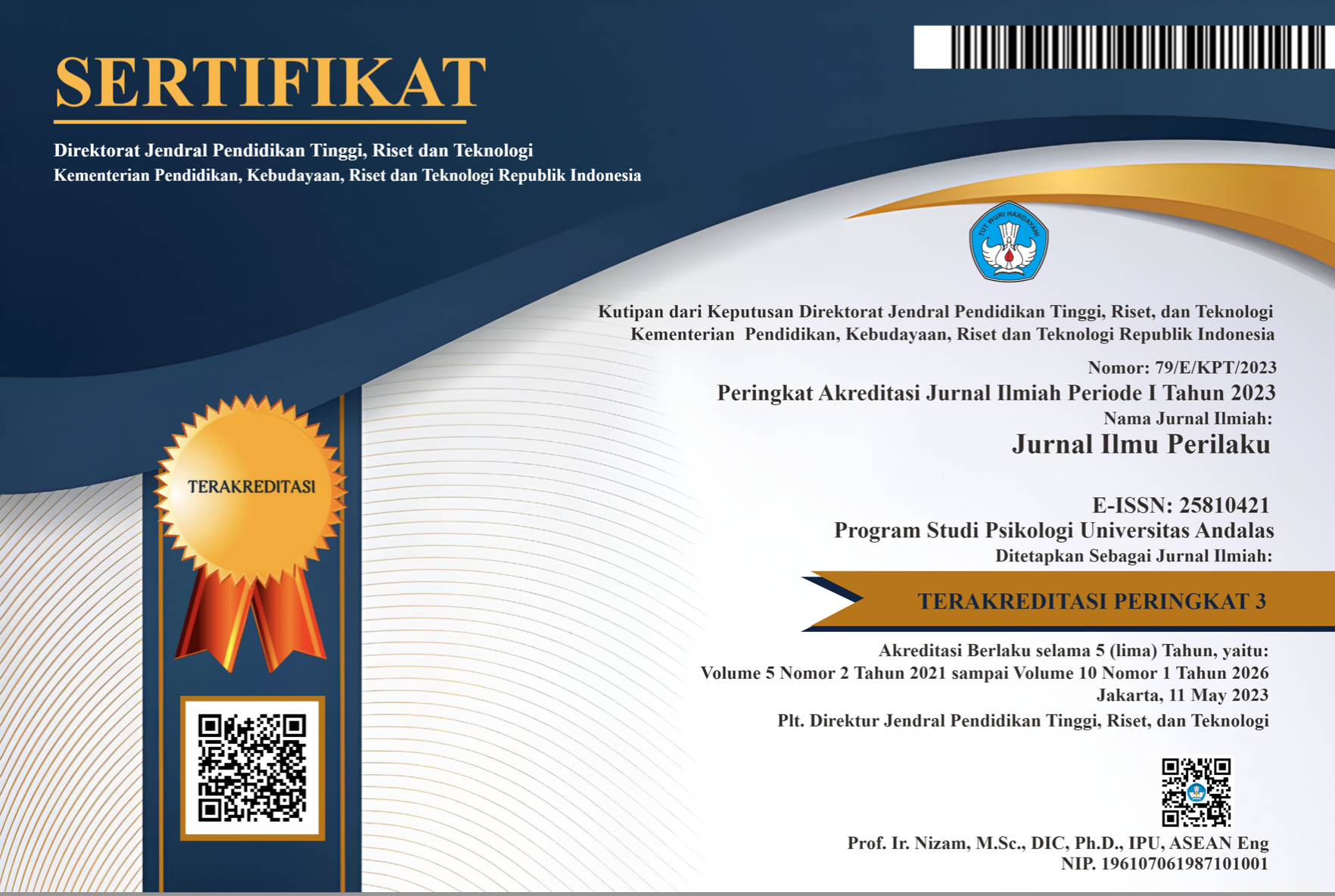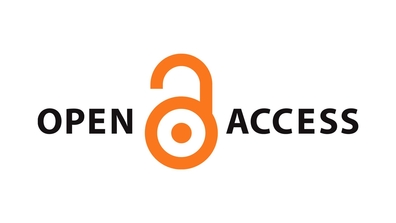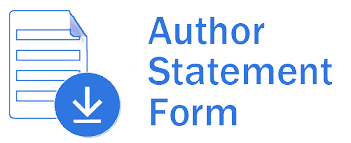Parenting Stress pada Ibu yang Bekerja: Peran Self-Compassion dan Dukungan Sosial
Abstract
Ibu yang bekerja seringkali merasakan parenting stress, terlebih lagi jika tidak dikelola dengan baik. Penelitian ini bertujuan untuk mengetahui peran self-compassion dan dukungan sosial terhadap parenting stress pada ibu yang bekerja. Pengambilan data dilakukan secara daring dengan total sebanyak 120 partisipan. Skala penelitian yang digunakan adalah skala self-compassion, parenting stress dan skala dukungan sosial. Pengambilan data dilakukan menggunakan metode purposive sampling dan menggunakan teknik analisis regresi. Hasil analisis menunjukkan bahwa self-compassion dan dukungan sosial memiliki pengaruh secara simultan terhadap parenting stress pada ibu yang bekerja. Dengan demikian, peneliti menyarankan kepada ibu yang bekerja agar dapat memiliki self-compassion dalam dirinya, serta memperkuat dukungan sosial agar mampu mengurangi kemungkinan parenting stress terjadi.
Downloads
References
Akin, A., & Akin, U. (2015). Self-compassion as a predictor of social safeness in turkish university students. Revista Latinoamericana de Psicologia, 47(1): 43-49. https://doi.org/10.1016/50120-0534(15)30005-4.
Andreadakis, E., Laurin, J.C., Joussement, M., & Mageau, G. A. (2020). Toddler temperamen, parenting stress, and autonomy support. Journal of Child and Personality Studies. https://doi.org/10.1007/s10826-020-01793-3.
Arfianto, M. A., Mustikasari., & Wardani, I. Y. (2020). Is social support related to psychological wellbeing in working mothers?. Jurnal Keperawatan Jiwa, 8(4). 505 – 514
Ati,R. M. S., Matulessy, A., & Farid, M. (2018). The Relationship Between Gratitude and Social Support with The Stress of Mother Who Have Children in Special Needs. Journal of Child Development Studies E, 3(1).
Berkman, L. F.,Glass, T.E., Brissette, I., & Seeman, T. E. (2000). From social integration to health: durkheim in the new millenium. Social Science and Medical Journal, 51(6), 843–857. https://doi.org/10.1016/s0277-9536(00)00065-4
Bhattacharjee, S., & Tripathi, P. (2012). A study on psychological stress of working women. International Journal of Multidisciplinary Research, 2(2), 434-445.
Fitriana, W. I., Husin, A., & Tahyudin, D. (2019). Proses pengasuhan anak balita pada ibu pekerja. Journal of Nonformal Education and Community Empowerment, 3(2): 131-138. https://doi.org/10.15294/pls.v3i2.34830
Gouveia, M. J., Carona, C., Canavarro, M. C., & Moreira, H. (2016). Self-Compassion and Dispositional Mindfulness Are Associated with Parenting Styles and Parenting Stress: the Mediating Role of Mindful Parenting. Mindfulness, 7(3), 700–712. https://doi.org/10.1007/s12671-016-0507-y.
Greaves, C. E., Parker, S. L., Zacher. H., & Jimmieson, N. L. (2017). Working mothers’ emotional exhaustion from work and care: the role of core self-evaluations, mental health, and control. Work & Stress, 31(2), 1-32. http://dx.doi.org/10.1080/02678373.2017.1303760
Howard, K., Martin, A., Berlin, L. J., & Brooks-Gunn, J. (2011). Early mother-child separation, parenting, and child well-being in Early Head Start families. Attachment and Human Development, 13(1), 5–26. https://doi.org/10.1080/14616734.2010.488119.
Kim, P. (2016). Human Maternal Brain Plasticity: Adaptation to Parenting. In New Directions for Child and Adolescent Development, 153, 47–58. https://doi.org/10.1002/cad.20168.
Leonhardt, M. (2020, December 3). 9.8 million working mothers in the U.S. are suffering from burnout. CNBC. https://www.cnbc.com/2020/12/03/millions-of-working-mothers-in-the-us-are-suffering-from-burnout.html
Moreira, H., & Canavarro, M. C. C. (2016). Parental attachment insecurity and parenting stress: The mediating role of parents’ perceived impact of children’s diabetes on the family. Family System Health, 34(3), 240–249. https://doi.org/10.1037/fsh0000211
Moreira, H., Gouveia, J. M., Carona, C., Silva, N, Nunes, J., & Canavarro, M. C. (2015). Exploring the link between maternal attachment-related anxiety and avoidance and mindful parenting: the mediating role of self-compassion. Psychology and Psychotherapy, 89, 369–384. https://doi.org/10.1111/papt.12082
Neff, K. D. (2011). Self compassion, self-esteem and well-being. Social and Personality Psychology Compass, 5(1), 1-12. https://doi.org/10.1111/j.1751-9004.2010.00330.x
Raes, E., Pommier, F., Neff, K.D., Van Gucht, D. (2011). Construction and factorial validation of a shrt form of the self-compassion scale. Clinical Psychology and Psychotherapy, 18(3), 250-255. https://doi.org/10.1002/cpp.702
Raphael, J. L., Zhang, Y., Liu, H., & Giardino, A, P. (2010). Parenting stress in U.S families: implications for paediatric healthcare utilization. Child Care Health Development, 36(2), 216-224. https://doi.org/10.1111/j.1365.2214.2009.01052.x.
Riany, Y. E., & Ihsana, A. (2021). Parenting stress, social support, self-compassion, and parenting practices among mothers of children with ASD and ADHD. Jurnal Penelitian Psikologi, 6(1), 47–60. https://doi.org/10.21580/pjpp.v6i1.6681.
Skreden, M., Skari, H., Malt, U. F., & Pripp, A. H. (2012). Parenting stress and emotional wellbeing in mothers and fathers of preschool children. Scandinavian Journal of Public Health, 40(7), 596-604. https://doi.org/10.1177%2F1403494812460347
Tahmassian, K., Anari., & Fathabadi, M. (2011). The influencing factors of parenting stress in iranian mothers. IPEDR, 5: 190-192.
Yulia, A. (2017). Working mom and kids. PT. Elex Media Komputindo.

This work is licensed under a Creative Commons Attribution-NonCommercial-ShareAlike 4.0 International License.
The non-commercial use of the article is governed by the Creative Commons Attribution license as currently displayed on Creative Commons Attribution-NonCommercial-ShareAlike 4.0 International License.
JIP's spirit is to disseminate articles published are as free as possible. Under the Creative Commons license, JIP permits users to copy, distribute, display, and perform the work for non-commercial purposes only. Users will also need to attribute authors and JIP on distributing works in the journal.
Please find the rights and licenses in Jurnal Ilmu Perilaku (JIP).
- License
The non-commercial use of the article will be governed by the Creative Commons Attribution license as currently displayed on Creative Commons Attribution-NonCommercial-ShareAlike 4.0 International License.
- Author’s Warranties
The author warrants that the article is original, written by stated author(s), has not been published before, contains no unlawful statements, does not infringe the rights of others, is subject to copyright that is vested exclusively in the author and free of any third party rights, and that any necessary written permissions to quote from other sources have been obtained by the author(s).
- User Rights
JIP's spirit is to disseminate articles published are as free as possible. Under the Creative Commons license, JIP permits users to copy, distribute, display, and perform the work for non-commercial purposes only. Users will also need to attribute authors and JIP on distributing works in the journal.
- Rights of Authors
Authors retain the following rights:
- Copyright, and other proprietary rights relating to the article, such as patent rights,
- The right to use the substance of the article in future own works, including lectures and books,
- The right to reproduce the article for own purposes, provided the copies are not offered for sale,
- The right to self-archive the article.
- Co-Authorship
If the article was jointly prepared by other authors, the signatory of this form warrants that he/she has been authorized by all co-authors to sign this agreement on their behalf, and agrees to inform his/her co-authors of the terms of this agreement.
- Termination
This agreement can be terminated by the author or JIP upon two months’ notice where the other party has materially breached this agreement and failed to remedy such breach within a month of being given the terminating party’s notice requesting such breach to be remedied. No breach or violation of this agreement will cause this agreement or any license granted in it to terminate automatically or affect the definition of JIP.
- Royalties
This agreement entitles the author to no royalties or other fees. To such extent as legally permissible, the author waives his or her right to collect royalties relative to the article in respect of any use of the article by JIP or its sublicensee.
- Miscellaneous
JIP will publish the article (or have it published) in the journal if the article’s editorial process is successfully completed and JIP or its sublicensee has become obligated to have the article published. JIP may conform the article to a style of punctuation, spelling, capitalization, referencing and usage that it deems appropriate. The author acknowledges that the article may be published so that it will be publicly accessible and such access will be free of charge for the readers.










